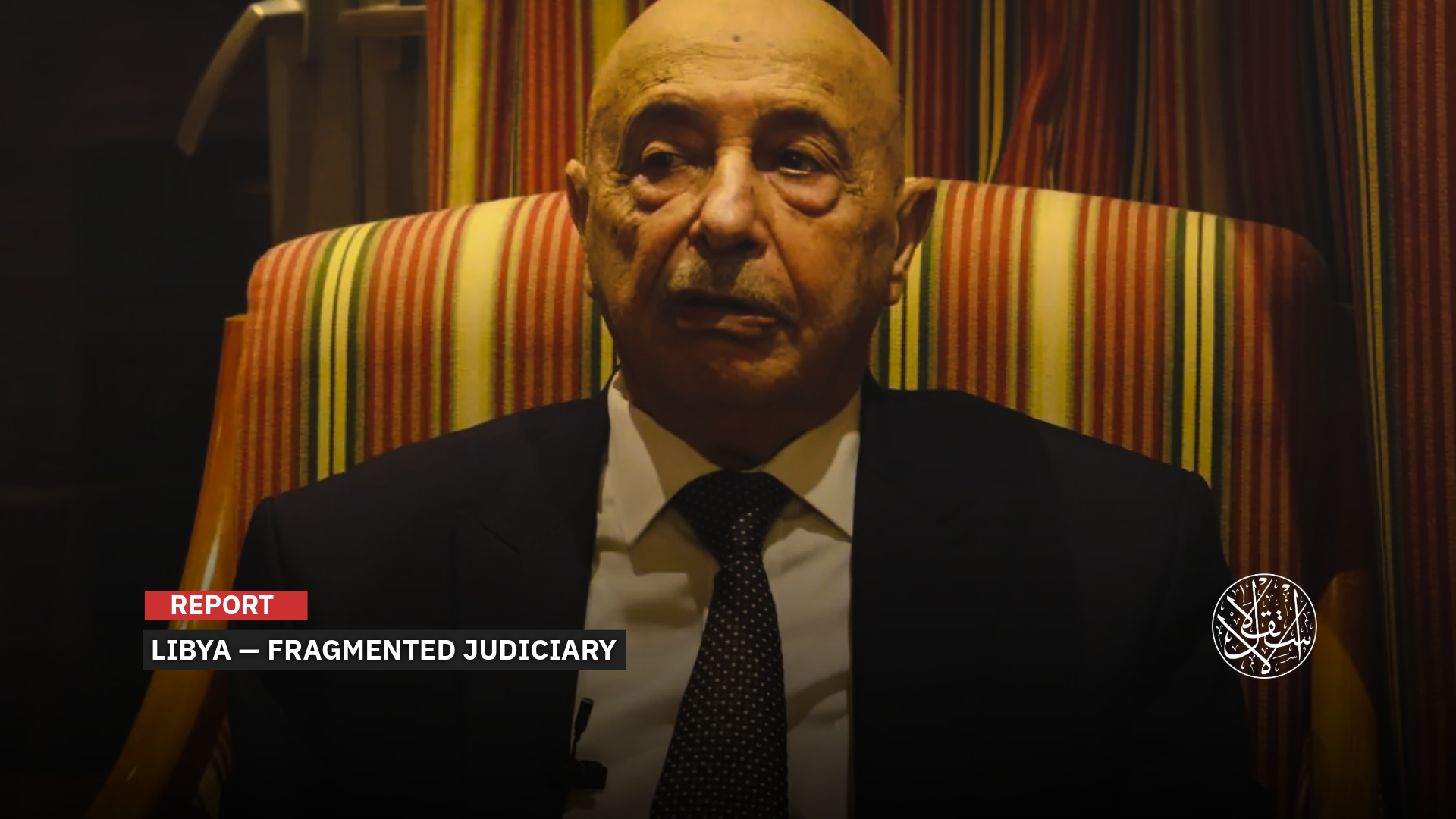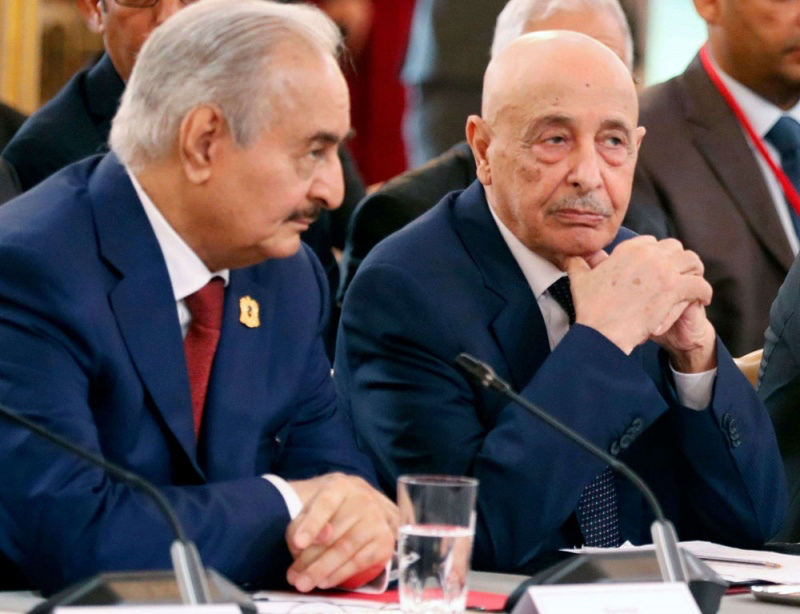Libyan Court Strikes Down Decisions of the Saleh-Haftar Parliament: What Has Been the Reaction in the East?

Ongoing clashes between judicial rulings risk creating a fragmented legal system.
Political divisions continue to plague Libya as a new chapter in legal controversy unfolds, following a ruling that struck down a law concerning the authority to issue the official gazette.
On November 3, 2025, the Constitutional Chamber of the Supreme Court issued a decision annulling Law No. 10 of 2022, which had transferred the power to publish the gazette from the Ministry of Justice to the House of Representatives.
The ruling, seen as a potential turning point in the country’s legal reform process, comes amid intensified efforts to unify institutions and strengthen the rule of law in a politically fractured Libya.
Since the fall of Muammar Gaddafi’s regime in 2011, Libya has been mired in deep divisions, giving rise to competing institutions, most notably the State Council and the internationally recognized government in Tripoli, and the House of Representatives along with a parallel administration loyal to the rebel general Khalifa Haftar in the east.
In 2022, the House of Representatives passed a law aimed at asserting control over the gazette, the official vehicle for publishing legislation.
The Constitutional Chamber, however, ruled that the move violated the principle of separation of powers, a cornerstone of the constitution, prompting the recent annulment.
The decision, which has sparked widespread debate, further declared that laws passed by the House of Representatives since 2022 suffer from “constitutional flaws,” requiring their redrafting and official publication through the Ministry of Justice’s gazette.
The court noted that “Supreme Court rulings reveal legal gaps, placing institutions under significant pressure to ensure adherence to the constitutional framework.”

Practical Steps
Immediately following the constitutional ruling, Presidential Council head Mohamed al-Menfi announced his intention to form a specialized legal committee tasked with reviewing all laws issued by the Tobruk-based parliament in the east.
In a statement on November 3, 2025, al-Menfi said the purpose of the review is to assess these laws and ensure their alignment with the provisions of the political agreement and constitutional requirements.
The announcement came alongside two significant rulings from the Constitutional Chamber of the Supreme Court.
The court struck down amendments passed by the House of Representatives that would have expanded the jurisdiction of military courts to include trying civilians in cases of terrorism and crimes targeting state officials.
In response to the rulings, al-Menfi welcomed the judgment declaring Law No. 10 of 2022 on the official gazette unconstitutional.
He emphasized that the Supreme Court’s decisions are revealing in nature, highlighting the constitutional flaws present in the laws since their enactment.
Al-Menfi underscored his commitment to the rule of law, respect for the judiciary, and its independence, reaffirming adherence to the constitutional and judicial process as the ultimate arbiter in political disputes.
In a similar vein, the High Council of State welcomed the Constitutional Chamber’s rulings declaring the laws on amendments to the official gazette and certain provisions of the military penal code unconstitutional.
The council, led by Mohamed Tekala, described the first ruling as restoring institutional balance between the legislative and executive branches, after the parliament violated the principle of separation of powers by transferring authority over the official gazette to itself, a clear overreach of its mandate.
The second ruling was hailed as a victory for rights and freedoms and a safeguard of constitutional protections for civilians, as it struck down provisions allowing civilians to be tried in military courts, aligning Libya’s laws with its international obligations under the International Covenant on Civil and Political Rights.
The High Council of State stressed that all authorities are obliged to respect the Supreme Court’s decisions, in adherence to the rule of law and the unity of the judiciary in Libya.
To prevent a legal vacuum resulting from the invalidation of the parliament-issued official gazette, the head of the Supreme Constitutional Court, Justice Mustafa Mohammed Abdul Jalil, ordered that “all pending cases and appeals before the Constitutional Chamber of the Court of Cassation (Supreme Court) be reheard.”
The decision emphasized that “laws and regulations issued by the House of Representatives remain in force, and may not be suspended, annulled, or amended except by legislation issued by the House itself.”
Judicial heads, the president of the Supreme Military Court, the military attorney general, and other relevant authorities were instructed to take all necessary measures to implement the decision within their respective jurisdictions.

Eastern Libya
In the other part of Libya, the head of the House of Representatives, Aguila Saleh, aligned with Khalifa Haftar’s authority, insisted that parliament is the body responsible for regulating the judiciary, and that its actions do not constitute interference in judicial work or independence.
In response to the constitutional ruling and comments by Presidential Council head Mohamed al-Menfi, the Libya Al-Ahrar website reported on November 4, 2025, that Saleh accused al-Menfi of interfering in both the legislative and judicial branches, describing his welcome of the Supreme Court’s rulings as an attempt to politicize the judiciary and cherry-pick decisions that suit him.
Regarding the withdrawal of constitutional oversight from the Supreme Court, Saleh clarified that “the House of Representatives granted this authority, and it is the body that revoked it.”
He added that the subsequent Constitutional Court law aims to establish a court composed of qualified, specialized judges dedicated full-time to this task.
Saleh argued that “Supreme Court judges have no mandate in this matter, as the authority to withdraw constitutional review from them was assigned to a body better equipped than judges, not qualified for this role.”
He also pointed to divisions within the Presidential Council itself, noting that two deputies, Abdullah al-Lafi and Musa al-Koni, had supported the House of Representatives’ law, in contrast to al-Menfi’s objections.
The two council members emphasized that “judicial independence is a guarantee for protecting rights and upholding the principle of legality,” warning against “dragging the judiciary into political disputes or using it as a tool to serve personal conflicts.”
The controversy did not stop with Aguila Saleh. Osama Hammad, the prime minister appointed by the House of Representatives in the east, joined the debate.
In a statement on November 3, Hammad asserted that the Constitutional Chamber of the Supreme Court is “legally abolished,” and that anything it issues “is equivalent to nothing.”
He maintained that all statements or decisions issued by the Presidential Council “have no legal effect,” citing the end of its mandate under the 2020 Geneva Agreement.
Hammad recalled that the Geneva Agreement, signed in 2020, led to the formation of the Presidential Council and the now-expired Government of National Unity, headed by Abdulhamid AlDabaiba, with the aim of unifying the country and preparing for presidential and parliamentary elections in December 2021.
He explained that Law No. 5 of 2023, issued by the House of Representatives to establish the Supreme Constitutional Court, effectively abolished the previous Constitutional Chamber of the Court of Cassation.
The law also required all pending appeals before the former chamber to be referred to the new Supreme Constitutional Court, which became the sole authority competent to hear such cases.
Hammad therefore argued that “any rulings issued by the previous chamber after this law carry no legal or judicial weight.”
He stressed that the Supreme Constitutional Court “has commenced its judicial duties with full authority,” warning that any continuation of the former chamber’s work “constitutes an attack on judicial unity and an attempt to drag it into division.”
The appointed prime minister emphasized that respecting legitimacy requires adherence to decisions issued by the House of Representatives, “as the legislative authority elected by the people,” and added that legal challenges to laws must follow the procedures set out in Law No. 5 of 2023, cautioning against “manufacturing judicial or constitutional crises for narrow political gains at the expense of state stability and sovereignty.”
Legitimacy Struggle
Political analyst and Libya specialist Mohamed Saleh al-Obeidi said that “the renewed verbal sparring between the House of Representatives and the Presidential Council reflects a struggle over legitimacy between the two sides, with each seeking to delegitimize the other.”
Speaking to Al-Estiklal, al-Obeidi warned that “this move by the head of the Presidential Council will only exacerbate and complicate the political landscape in the country, particularly given his insistence on reviewing laws passed by parliament and the official gazette.”
“The political scene in Libya cannot bear further escalatory steps, whether from parliament, the Presidential Council, or any other body,” he stated, especially amid the resurgence of armed clashes at every opportunity, which threatens the fragile ceasefire.
Regarding the future implications of the Constitutional Chamber’s ruling and how it should be treated, legal adviser Osama Abu Naji said that attempts to challenge or cast doubt on the Supreme Court’s authority are unacceptable and will not undermine it.
Speaking to the local site Libya 24 on November 7, 2025, Abu Naji affirmed that the Supreme Court, particularly the Constitutional Chamber, “still stands on solid ground.”
He noted that this foundation has been built over 73 years of continuous work, describing the institution as a firmly established judicial body with a wealth of long-standing legal rulings and principles.
Abu Naji described current events as “merely an attempt to destabilize Libya’s judicial system,” emphasizing that all authorities must respect the Supreme Court’s decisions.
He warned that continued conflict between judicial rulings would create a fragmented legal system, where certain laws would apply only in the west while remaining unenforceable in the east, and vice versa.
He highlighted that this situation could have a profound effect on existing legislation, particularly following the recent annulment or amendment of the official gazette law, which would render many previously published laws legally invalid.
According to Abu Naji, laws cannot be enforced without proper publication, as publication is a prerequisite for their legal effect.
He added that, under the current circumstances, authorities, both executive and judicial, cannot rely on or implement these laws, placing the country in a deep legal crisis.
On potential solutions to this conflict, Abu Naji pointed to the political agreement, which established a clear mechanism for passing legislation during the transitional period, including the formation of a committee to review laws enacted before the agreement.
He called for a return to respect for the rule of law and for executive and judicial authorities to adhere to the Supreme Court’s rulings, particularly constitutional ones.
Abu Naji concluded by asserting that Libya needs to return to a genuine democratic path that reinforces the rule of law and guarantees judicial independence, free from political interference that could jeopardize the country’s future.
Sources
- The Supreme Court… Annulment of Laws Passed by the House of Representatives and Institutional Disputes [Arabic]
- Aqila to Al-Manfi: Do Not Interfere in the Judiciary [Arabic]
- Al-Manfi Welcomes Ruling Declaring the Official Gazette Law Unconstitutional [Arabic]
- Legal Adviser: Ignoring Supreme Court Rulings Threatens State Stability [Arabic]











